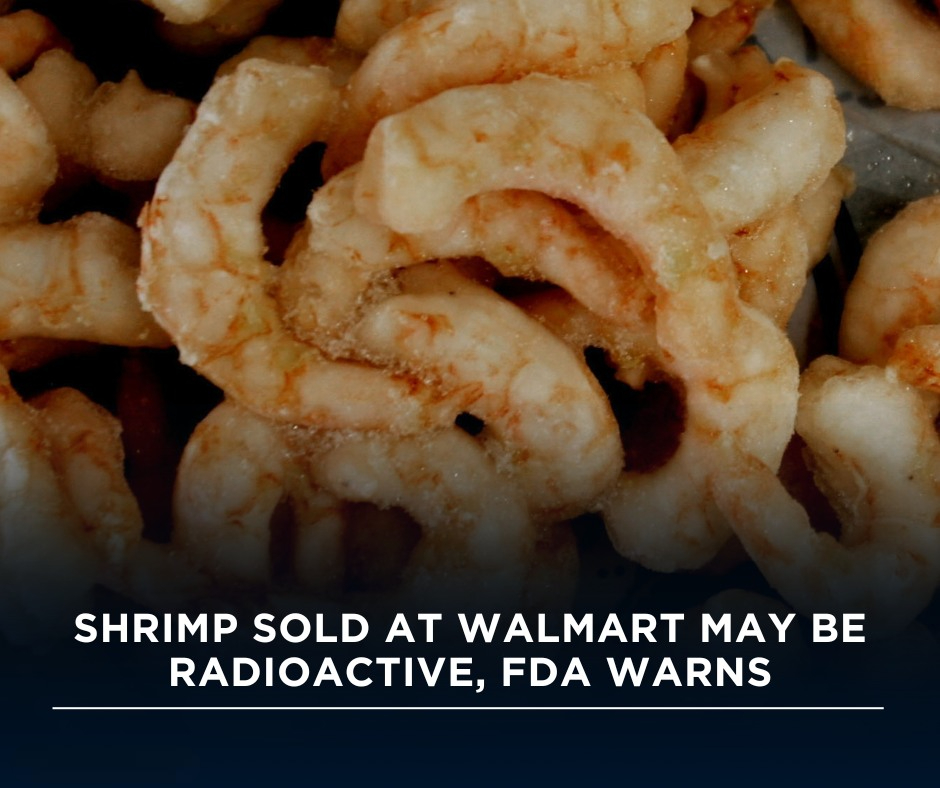The Food and Drug Administration has issued a serious consumer alert regarding certain frozen shrimp sold under Walmart’s Great Value brand after testing revealed traces of Cesium-137, a man-made radioactive isotope commonly produced during nuclear reactions.

While the amounts found in the tested shipments were below the agency’s “derived intervention level,” meaning they do not present an immediate or acute threat to human health, the FDA emphasized that the recall was initiated to minimize any potential risk associated with prolonged exposure to low-level radiation. Scientific studies have long established that even low doses of radiation, if consumed over extended periods of time, can increase the risk of developing cancer, which is why the agency acted quickly and decisively. The shrimp affected by this recall are specifically the Great Value Frozen Raw Ez Peel Tail-On Farm-Raised White Vannamei Shrimp, packaged in 2-pound bags with a best-by date of March 15, 2027, and carrying the item code 738108.
The three impacted lot codes are 8005540-1, 8005538-1, and 8005539-1. These products were distributed to Walmart stores across several states, including Alabama, Arkansas, Florida, Georgia, Kentucky, Louisiana, Missouri, Mississippi, Ohio, Oklahoma, Pennsylvania, Texas, and West Virginia. Consumers in these states who may have purchased shrimp falling within these specific codes are urged to check their freezers immediately and dispose of the product. The FDA has been working in partnership with U.S. Customs and Border Patrol to ensure that none of the contaminated shipments enter the broader U.S. market.
So far, contaminated lots have been intercepted at four different American ports, and the agency confirmed that none of the shrimp testing positive for Cs-137 has actually reached store shelves or consumers beyond the recalled lots. Nevertheless, out of an abundance of caution, the recall was broadened to cover all potentially compromised products. The agency has also urged consumers not to eat, cook, or serve any of the recalled shrimp, stressing that discarding the product is the safest course of action. The recalled shrimp was imported from Indonesia and processed by PT. Bahari Makmur Sejati, a seafood company now under scrutiny.
As part of its response, the FDA has added the firm to an import alert list, which effectively blocks all further shipments of seafood from the company from entering the United States until the contamination issue is resolved. This move is intended not only to safeguard consumers but also to pressure the company and Indonesian seafood authorities into investigating and addressing the source of the contamination.
The FDA confirmed it is working closely with Indonesia’s regulatory agencies to determine how the radioactive isotope made its way into the shrimp supply chain. Cesium-137 contamination can occur through several potential pathways, such as environmental exposure from industrial or nuclear activity, improper processing, or exposure to contaminated water sources where the shrimp were raised.
As the FDA’s investigation continues, the agency stressed that consumer safety remains its top priority. Food recalls, particularly those involving potential radioactive contamination, are rare, but they underscore the importance of rigorous testing and international cooperation in protecting the food supply. The agency also reminded the public that while the immediate health risk from this specific incident is considered low, vigilance is essential. Repeated or cumulative exposure to contaminated food could pose significant long-term risks, making recalls like this a necessary precautionary measure. For Walmart customers, the company has stated that they are cooperating fully with the FDA and that all affected products are being removed from store shelves. Shoppers can return recalled shrimp to stores for a refund or simply dispose of the product to avoid any potential risk.
Public health experts recommend that consumers always pay attention to recall notices, check lot numbers carefully, and prioritize safety over the inconvenience of discarding food. The incident also serves as a reminder of how globalized food production has become. With seafood and other products frequently imported from across the world, U.S. agencies like the FDA must rely on partnerships with international regulators to ensure food safety standards are met consistently. While most imported food passes safety checks, cases like this highlight the vulnerabilities that can arise when contamination goes undetected until testing reveals the problem.
The FDA has pledged to provide ongoing updates as the investigation progresses, including any new findings about the source of the contamination and whether additional safety measures will be implemented moving forward. Until then, consumers are strongly urged to heed the recall notice, dispose of any shrimp that matches the affected lot codes, and remain alert to further announcements. This case is a reminder that while modern food safety systems are robust, they are not infallible, and consumer awareness plays an important role in ensuring health and safety.





